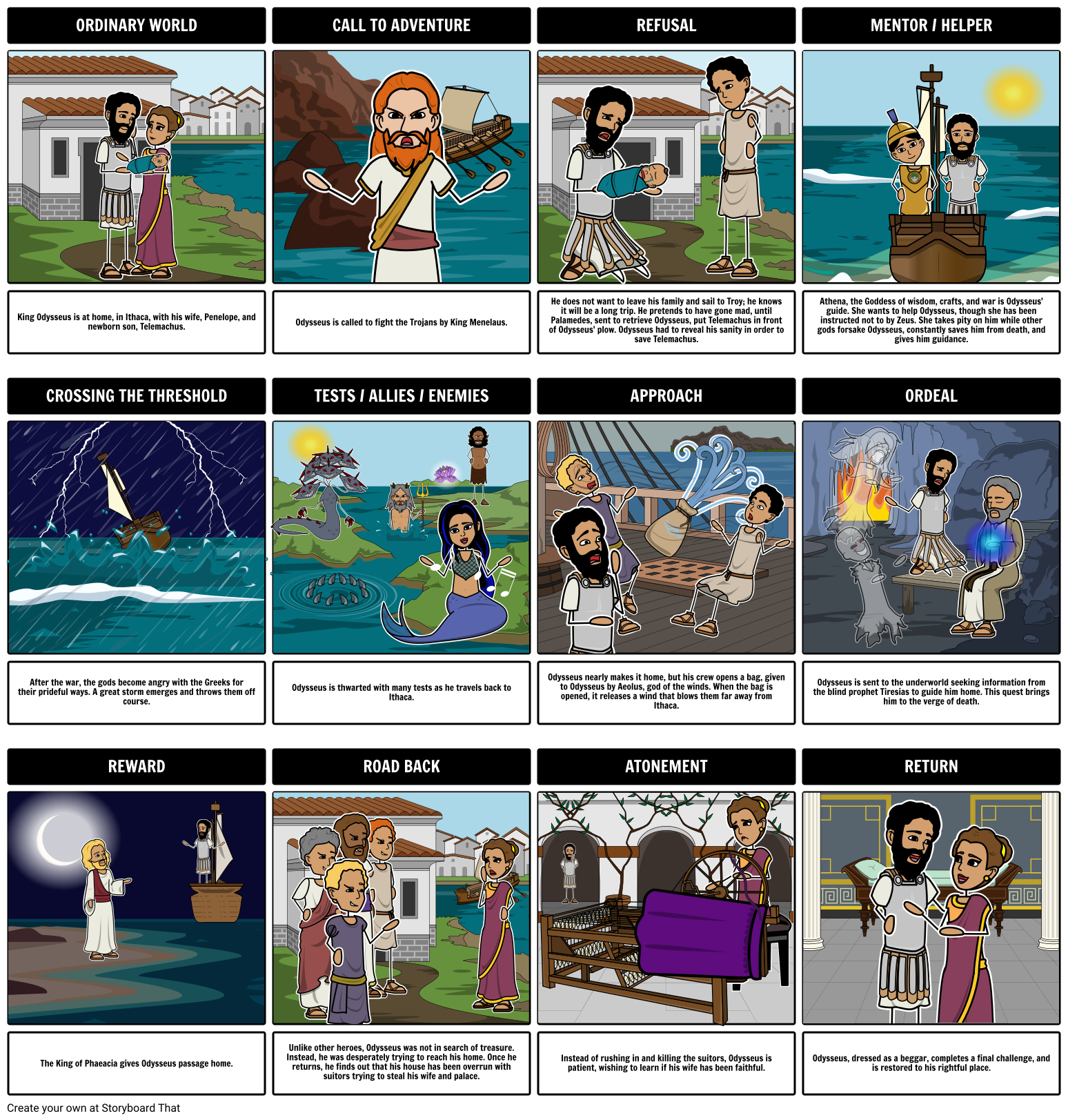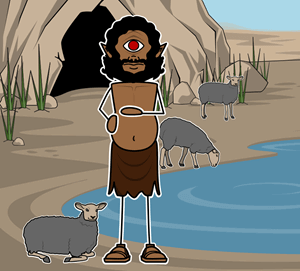The Odyssey Heroic Journey - Examples of hero's journey

You can find this storyboard in the following articles and resources:

The Hero’s Journey
Lesson Plans by Rebecca Ray
Related to both plot diagram and types of literary conflict, the ”Hero’s Journey” is a recurring pattern of stages many heroes undergo over the course of their stories. The most basic version has 12 steps, while more detailed versions can have up to 17 Hero's Journey steps.

Narrative Structure
Lesson Plans by Rebecca Ray
Literature has many forms, and each form has its own unique structure for telling a story. When studying, teaching, or learning about narration in literature, it is also important to understand its underlying arrangement. How is it created? What are the parts of a story? What aspects differ from one form to another?

Traditional Storyboard Layout
Lesson Plans by Anna Warfield
A storyboard is a graphic organizer that uses images to tell a story. The traditional storyboard is a perfect start for digital storytelling, creating graphic organizers, and helping students visually reinforce their learning.

Teaching Archetypes in Literature
Lesson Plans by Kristy Littlehale
Archetype examples are found in the world around us every day: in our speech, our beliefs, media, sports, video games, psychology, art, and even our dreams. Archetypes are universal; that is, they occur across all cultures, religions, and parts of history.

Graphic Novels in the Classroom
By Anna Warfield and Liane Hicks
It's not a comic book, it's a graphic novel! Help your students start their very own graphic novel or turn whatever you are reading into a graphic novel version!

Real-Time Collaboration
Real-time collaboration also makes it possible for students to work together no matter where they are. Teachers can assign homework and projects that can be worked on outside of class, or if students have to be remote for any reason.

The Odyssey by Homer
Lesson Plans by Rebecca Ray
The Odyssey by Homer is the story of Odysseus, the crafty king of Ithaca, whose Trojan Horse idea helped win the war with Troy. Following his victory in Troy, he encounters many trials that delay him from reaching his home, Ithaca, and his queen, Penelope. Odysseus' Hero's Journey is a long and arduous adventure filled with peril, temptation, and wits.
'
Storyboard Description
Study Odysseus Heroic Journey - Homer Odyssey | Narrative Structure Example from Literature
Hero's journey.
graphic novel examples
Storyboard Text
- ORDINARY WORLD
- CALL TO ADVENTURE
- REFUSAL
- MENTOR / HELPER
- King Odysseus is at home, in Ithaca, with his wife, Penelope, and newborn son, Telemachus.
- CROSSING THE THRESHOLD
- Odysseus is called to fight the Trojans by King Menelaus.
- TESTS / ALLIES / ENEMIES
- He does not want to leave his family and sail to Troy; he knows it will be a long trip. He pretends to have gone mad, until Palamedes, sent to retrieve Odysseus, put Telemachus in front of Odysseus' plow. Odysseus had to reveal his sanity in order to save Telemachus.
- APPROACH
- Athena, the Goddess of wisdom, crafts, and war is Odysseus' guide. She wants to help Odysseus, though she has been instructed not to by Zeus. She takes pity on him while other gods forsake Odysseus, constantly saves him from death, and gives him guidance.
- ORDEAL
- After the war, the gods become angry with the Greeks for their prideful ways. A great storm emerges and throws them off course.
- Odysseus is thwarted with many tests as he travels back to Ithaca.
- Odysseus nearly makes it home, but his crew opens a bag, given to Odysseus by Aeolus, god of the winds. When the bag is opened, it releases a wind that blows them far away from Ithaca.
- Odysseus is sent to the underworld seeking information from the blind prophet Tiresias to guide him home. This quest brings him to the verge of death.
- REWARD
- ROAD BACK
- ATONEMENT
- RETURN
- The King of Phaeacia gives Odysseus passage home.
- Unlike other heroes, Odysseus was not in search of treasure. Instead, he was desperately trying to reach his home. Once he returns, he finds out that his house has been overrun with suitors trying to steal his wife and palace.
- Instead of rushing in and killing the suitors, Odysseus is patient, wishing to learn if his wife has been faithful.
- Odysseus, dressed as a beggar, completes a final challenge, and is restored to his rightful place.
Over 30 Million Storyboards Created
No Downloads, No Credit Card, and No Login Needed to Try!








